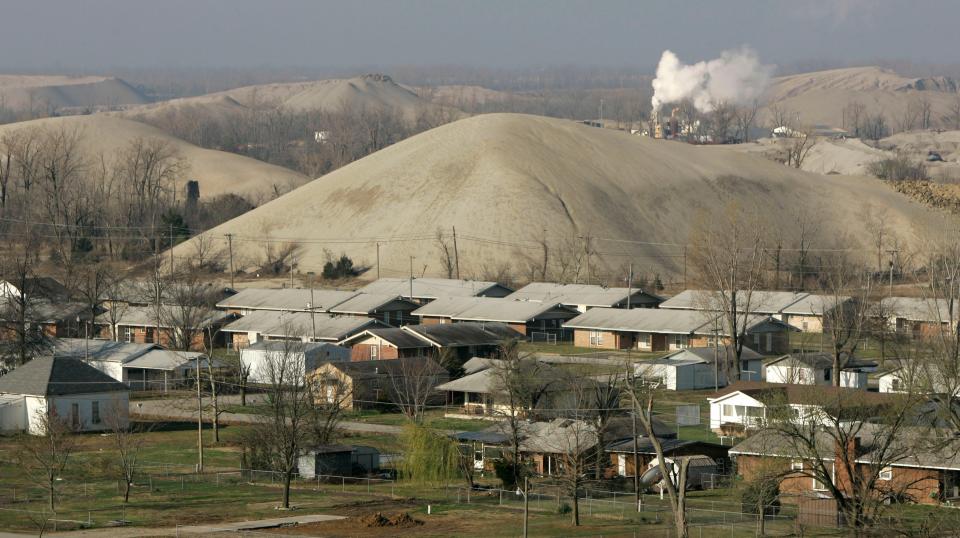Residents worry water level changes at Grand Lake will lead to toxic flooding upstream
Residents of northeastern Oklahoma communities who have been affected by flooding and toxic mining leftovers are asking federal regulators for more community involvement before relicensing the hydroelectric dam at Grand Lake.
The 84-year-old Pensacola Dam generates electricity for Grand River Dam Authority customers. The power generation project currently is navigating its periodic licensing renewal with the Federal Energy Regulatory Commission.
As part of its relicensing effort, GRDA wants to increase the maximum reservoir level by one foot while scrapping a seasonal schedule that sees the targeted level fluctuate based on the time of year.
Members of the Local Environmental Action Demanded (LEAD) Agency, an area advocacy group, worry that raising the water level will make flooding worse at the lake's upstream rivers. Over the years, GRDA already has asked for and received substantial changes to raise water level limits, said LEAD Agency's advocate for Grand Lake, Martin Lively.
And it's not just the risk from the water. Upstream from the lake is the Tar Creek Superfund site, an abandoned lead and zinc mining operation that left behind toxic heavy metals. Lively said the entire watershed is at risk from the long-abandoned mining operations that dot the nearby landscape in northeastern Oklahoma, Missouri and Kansas.
"All of these streams are contaminated and have been for over 100 years," Lively said.

And when the rivers crest their banks during a flood, those heavy metals can come along for the ride.
GRDA said it proposed the new water level targets based on grid demands, market conditions and public interest. But according to the LEAD Agency, nearly 1,500 homes along the rivers and tributaries that feed into Grand Lake sit in a toxic flood zone.
The LEAD Agency, with help from the Environmental Advocacy Clinic at the Vermont Law and Graduate School, are asking the Federal Energy Regulatory Commission to implement a comprehensive and robust Community Participation Plan that tailors engagement with tribal and community stakeholders, includes public meetings that are available online, translates commission documents into understandable language and significantly expands the window for public comment.
"LEAD Agency is calling on FERC to go beyond the standard, or the status quo, and provide for more robust community engagement just due to all the environmental justice and public health impacts in this particular relicensing," said Greta Raser, a student attorney with the Environmental Advocacy Clinic.
The federal commission is expected to formally begin its review of GRDA's application in the coming weeks or months.
Cristophe Courchesne, director of the Environmental Advocacy Clinic, said GRDA has steadfastly denied responsibility for contamination impacts upstream during flooding events. He said they've also used a 2020 law to argue that the federal commission has limited authority to regulate water levels at Grand Lake.
That law was an amendment to the 2020 defense spending bill authored by former U.S. Sen. Jim Inhofe, who owns property on the lake.
"GRDA is repeatedly making the argument that that law absolves them of any impacts of their project outside of the typical operating conditions," Courchesne said. "As we've asserted, as the city of Miami has asserted, we don't believe that's the law. And it also is deeply disappointing that GRDA would approach these really serious community concerns with this lack of accountability for what the dam operation means upstream."
When asked for a response to the allegations and the request for more community participation, GRDA didn't have much to say.
"While operating Grand Lake under this license and abiding by these laws, GRDA has a strong commitment to long-term solutions that benefit all parties, including our electric customers, the recreating public, and the people of Oklahoma," said spokesman John Wiscaver. "Due to ongoing litigation, we can provide no further comments at this time."
This article originally appeared on Oklahoman: Grand Lake dam Oklahoma: Upstream residents worry about toxic floods

